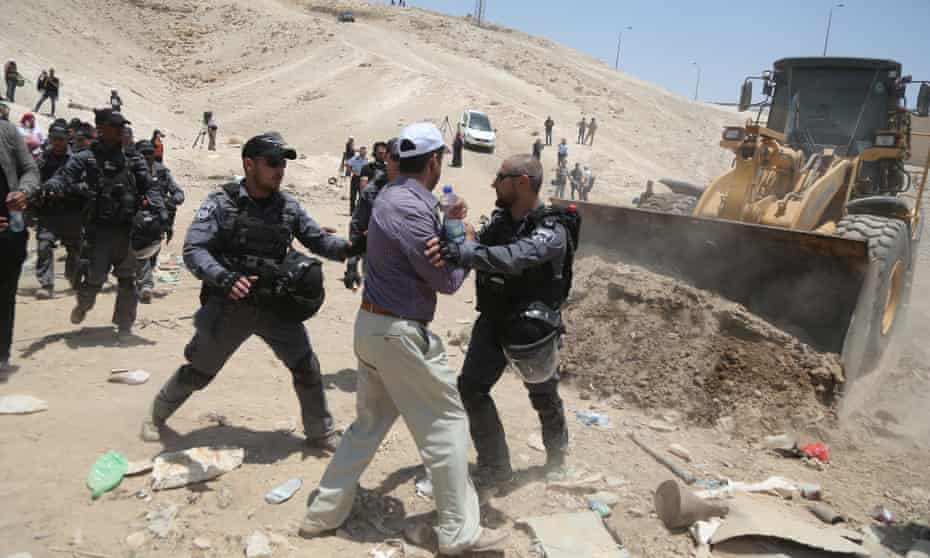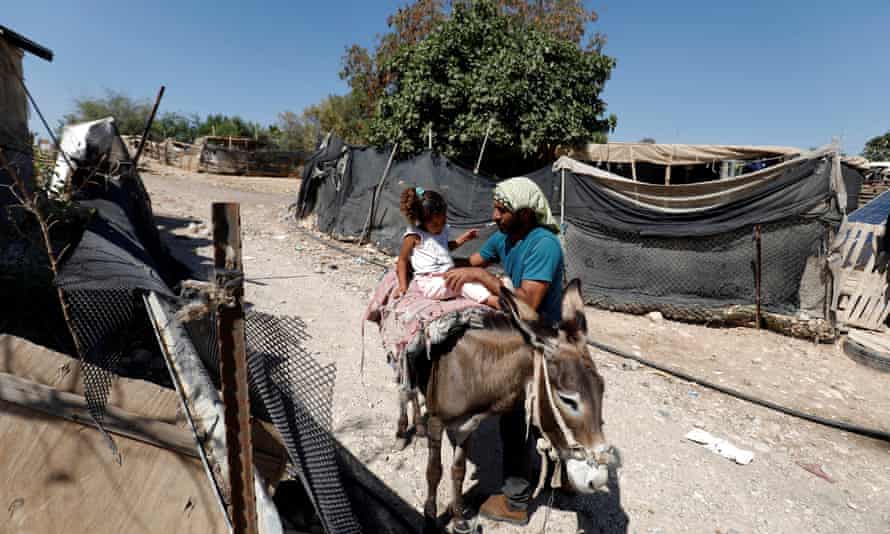 ‘We sleep afraid, wake afraid’: in the West Bank village facing destruction
‘We sleep afraid, wake afraid’: in the West Bank village facing destructionCommuters speeding along the four-lane highway that connects Jerusalem to Jericho might not notice this tiny Bedouin village of fewer than 200 people tucked in the dip of two hills. Tents hoisted with chipped scrap-wood and sand-covered corrugated-iron shacks are home to once-nomadic families who settled after the Israeli army expelled them from the southern desert seven decades ago. Some residents work in nearby factories owned by Israeli settlers. Others herd sheep and goats on the scorching rocky terrain.
But Khan al-Ahmar’s modest appearance belies its significance to many Palestinians as the keystone of their struggle for statehood – a community whose location is so strategic that, if they were removed, it might crumble hopes for a future country.
After years of resistance against Israeli demolition orders that say the makeshift village in the occupied West Bank is illegally built, last week brought what appeared to be final preparations for its destruction.
Security forces declared the area a closed military zone and blocked journalists and diplomats from entering. Bulldozers with military escorts rumbled in and began levelling the ground.
In the upper part of the village, Tahreer Abu Dahouk, a mother of four children all under 10, stood in her kitchen. A large blue plastic barrel held water, charred pots and pans hung on wooden hangers, and the roof was blackened by the soot from a fire pit. “We sleep afraid; we wake up afraid. They are serious,” she said as border police in grey uniforms patrolled outside.
On Wednesday, when Israeli forces first entered, they wounded 35 Palestinians and arrested others, according to the United Nations. One Israeli soldier was also reported injured. “It was war here,” said Abu Dahouk, who married into the village 14 years ago.

Outside her home is a small garden in the desert hills, a lone pomegranate tree bearing light pink fruit. “We are settled now,” she said. “We refuse to leave. Leave us alone. This is the best place for us.”
Khan al-Ahmar is one of several communities in the West Bank under threat. Since its people arrived decades ago as refugees, Israeli settlements built on occupied land – supported with water and electricity – have sprung up on the surrounding hilltops.
In contrast, the Jahalin tribe who live in Khan al-Ahmar are restricted on where they can roam with their livestock and Israeli authorities have not hooked up their homes to running water, electricity or a sewerage system. They have portable toilets, although opening their doors shows they are merely a closed box with a hole in the floor.
Homes have been ripped down in the past because their construction has been declared illegal while building permits are nearly impossible for Palestinians to obtain there.
Around 2km to the north is the Israeli settlement of Kfar Adumim, which has plans to extend closer to Khan al-Ahmar. On Thursday, settlers brought Israeli flags to a hilltop overlooking the village in a show of support for the demolition.
Others, a small group of people from Kfar Adumim, have gone against their neighbours and lobbied to allow the Bedouin to stay, saying the communities can coexist.
But the fight is bigger than that of two communities. The Palestinian government warns that removing the village is part of a broader push to annex the West Bank.
One of the few remaining Palestinian sites east of Jerusalem, its demise would contribute to the encircling of the holy city by Jewish settlements on one side, effectively blocking it off entirely from the West Bank. The move would isolate East Jerusalem, which Palestinians claim as their future capital.
Further Israeli settlement construction in the area, along a road leading to the Dead Sea, would divide the occupied Palestinian Territories in two, cutting the north from the south.

There would be no continuous Palestinian land on which to build a state, already profoundly fragmented by military rule as well as Israeli-built walls, roads and settlements.
“If this community disappears, the north will disappear from the south,” said one resident, Faisal Abu Dahouk, 43. To him, the timing of the demolition is no coincidence. Israel’s prime minister, Benjamin Netanyahu, has been bolstered by the Trump administration, which has already declared Jerusalem Israel’s capital and cut aid to Palestinians. Trump’s ambassador to Israel, David Friedman, is a hardline pro-settler lawyer.
“They gave them an OK,” Abu Dahouk said of Trump and Israel. During the past few days, there has been a wave of demolitions across the West Bank, displacing dozens of Palestinians.
The Israeli authorities say they have offered villagers in Khan al-Ahmar a relocation site, although it is just a few hundred metres from a rubbish dump, and in an urban setting with little room for sheep.
The Palestinian government says a forcible transfer of people from their homes by an occupying power is a war crime. And foreign governments warn that Khan al-Ahmar’s location makes it vital to the moribund two-state solution.
Britain’s minister of state for the Middle East, Alistair Burt, told the Commons last week that the demolition was “fundamentally wrong”. But in nearly an hour of questioning from MPs, the minister was told that repeated condemnations were not enough and further action, such as economic sanctions on settlements or measures to support Palestinian statehood, was needed.
“Before the actions of the Netanyahu government render a two-state solution a geographical impossibility … this is the time for the United Kingdom to lead the major nations of the world in recognising the Palestinian state, and to do so immediately while there is still a state left to recognise,” said Emily Thornberry, the shadow foreign secretary.
It is not clear if international pressure has worked. Late on Thursday, Israel’s high court granted a temporary injunction on the demolition until Wednesday.
The reprieve followed a petition by the village’s residents, the latest of hundreds of attempts over the years to help the community. In 2009, a school was built with EU funding out of rubber tyres and mud as a way to circumvent Israeli rules preventing building with cement. But the authorities still ordered it be shut down.
At the school last week, young children played in the astroturf garden and swung from tree branches. Some gathered at the fence and peered through at the large yellow bulldozer flattening the road outside.
Abu Dahouk sat nearby. “They suffocated us,” he said.
www.theguardian.com/world/2018/jul/07/khan-al-ahmar-west-bank-bedouin-village-facing-destruction


